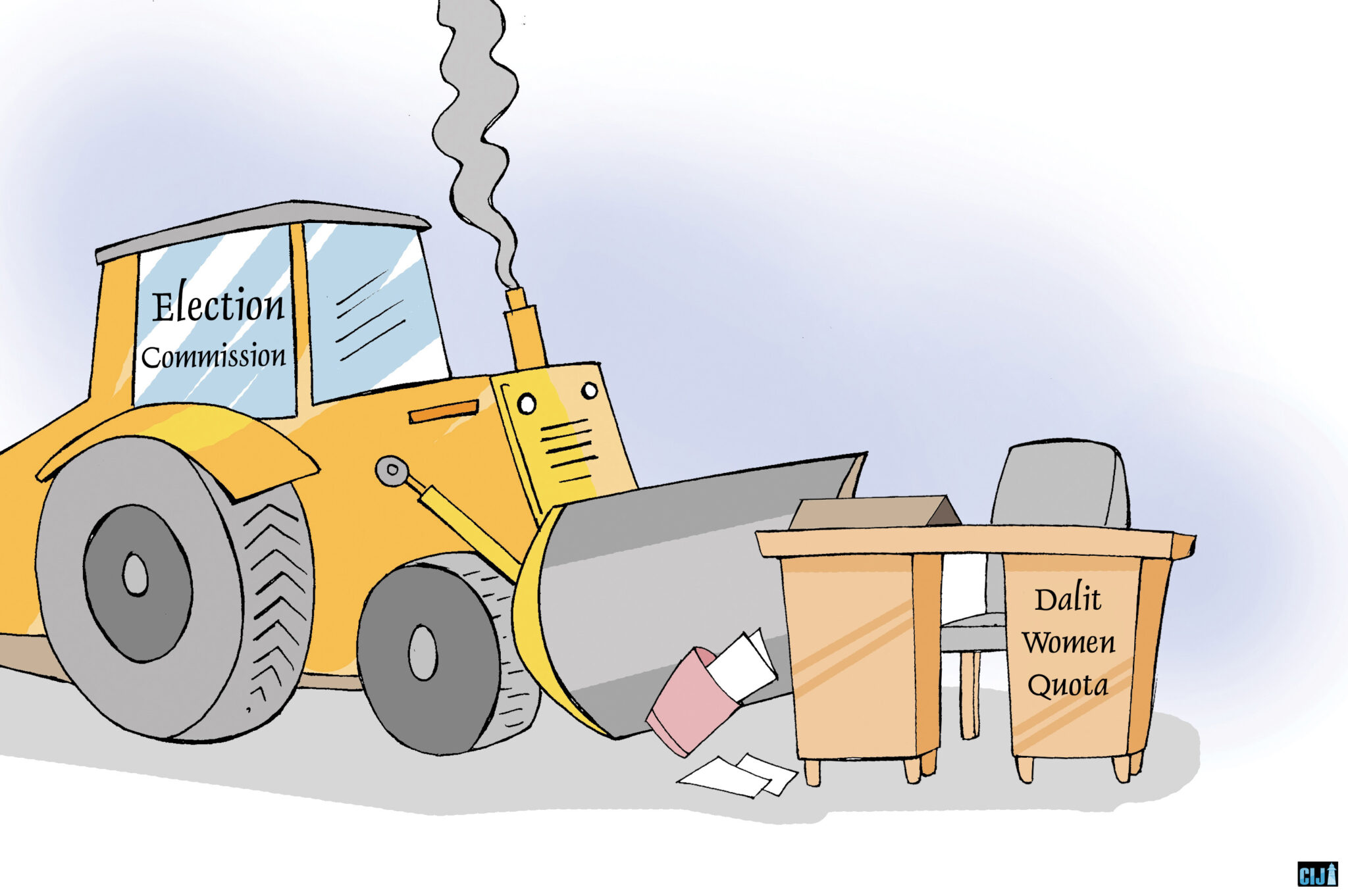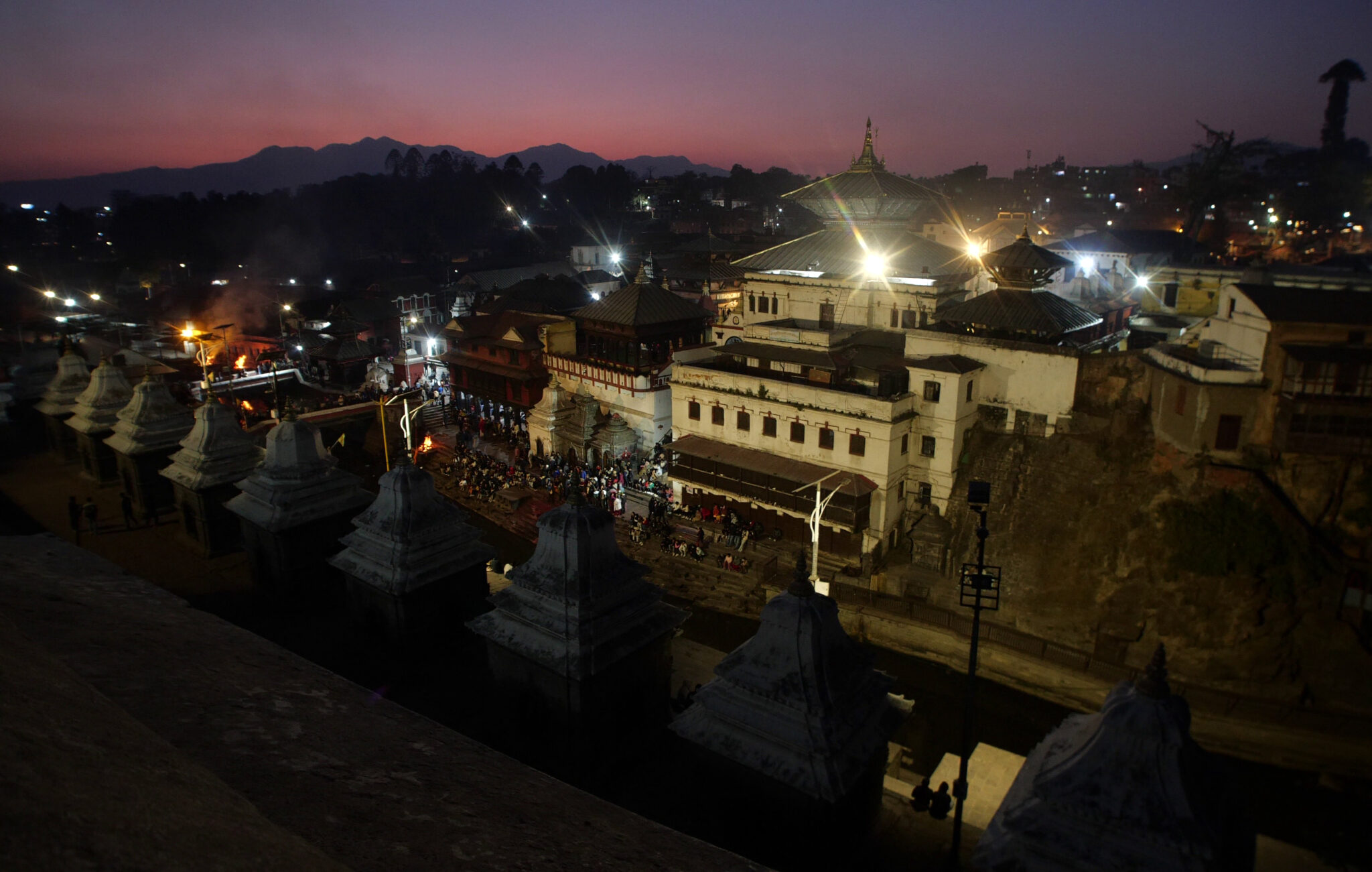Even as the very significance of the Constituency Development Fund is being questioned, lawmakers continue to spend money in the name of administrative expenses. The Centre for Investigative Journalism analyses the reckless administrative expenses of seven members of parliament representing Siraha and Saptari districts.
Surendra Kumar Kamati |CIJ, Nepal
Ashok Kumar Yadav was a directly elected member in the previous Madhes Province Assembly representing Siraha Constituency 1 (A). In the fiscal year 2021/22, under the Provincial Assembly Member Constituency Development Programme, he spent Rs30 million, out of which Rs5 lakh was allocated for administrative expenses.
Yadav, who was elected from the CPN-UML and later aligned with CPN-Unified Socialist, spent Rs18,000 to purchase newspapers such as Kantipur, Gorkhapatra, Nagarik, Annapurna Post, Janakpur Today and Apan Daily for a year. However, due to the Covid-19 pandemic, distribution of daily newspapers had halted in Siraha district.
A cash bill (no: 933) issued by the Sita Nobel News Centre, Lahan-1, on Ashad 8, 2078 shows the cost of the newspapers to be Rs18,000.
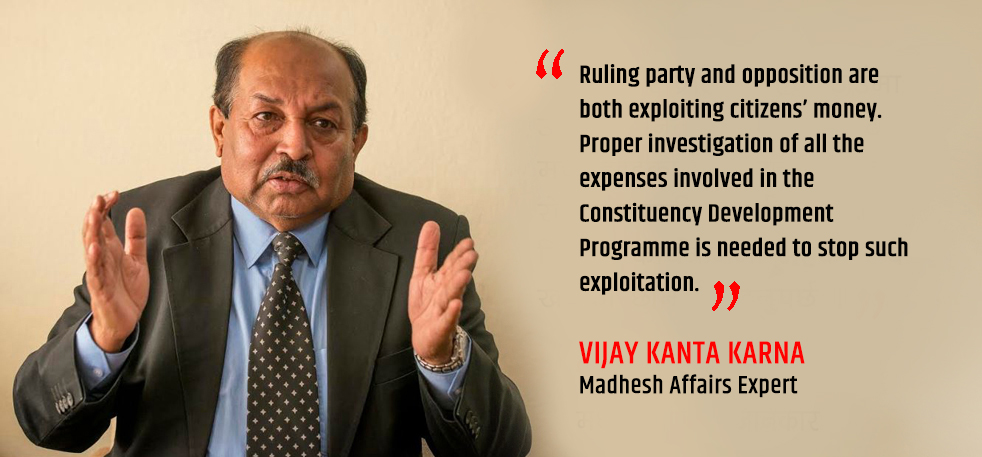
Yadav spent Rs6,500 from the administrative expense to buy 10 reams of photocopy paper. Apart from that, he has also presented a bill showing the rent of a private vehicle (reg no: BA 11 CHA 3018), costing Rs200,000 for 40 days. It is not clear which project was monitored with the use of the vehicle when there were restrictions due to the second wave of the pandemic. This shows a clear violation of the rule that administrative expenses cannot be made on private vehicles.
According to Section 8 of the Motor Vehicles and Transport Management Act, 2049 (1993), a private motor vehicle having obtained the certificate of registration for private use shall not be used for the transport or other services.
Yadav has also presented a bill that details other expenses: Rs117,500 on salary for his assistant for five months; Rs83,200 on wage for daily wage workers for five months; Rs75,00 on office rent.
He ran for the candidacy again in the November 2022 elections but lost.
Yadav acknowledges a failure in keeping track of the administrative expenses. “There has been a failure in checking where the office was opened, and where the money was spent. It is difficult to authenticate the bill at the Infrastructure Development Office.”
There are many members who have misused the amount of the “Provincial Assembly Member Constituency Development Programme’.
The then Province-2 (currently Madhesh Province) emulated the federal parliament and allowed each directly elected member to spend Rs1 million under the ‘Provincial Assembly Member Constituency Development Programme’ in the fiscal year 2074/75. In the fiscal year 2076/77, the amount was increased to Rs3o million for directly elected members while it was fixed at Rs10 million for members elected through proportional representation.
The Madhesh Province has continued the programme, allocating Rs2.35 billion in the fiscal year 2079/80.
In Madhesh Province, there are a total 107 members of House of Representatives–64 from the direct election and 43 from the proportional representation. The total amount of administrative expense allocated for the 107 members is Rs267.5 million. They have used the gaps in the procedure to spend the money for their own benefit by preparing fake papers.
Where has Rs260 million gone?
The meeting of Council of Ministers of Madhesh Pradesh on Shrawan 2, 2079 had revised the procedure of Provincial Assembly Member Constituency Development Programme for the fourth time. The purpose of revising the regulations of procedure was the pressure the members had given to spend Rs2.35 billion before the election on November 20, 2022. Accordingly, the Ministry of Physical Infrastructure on July 24, 2022 called for the programme to run beginning August.
However, the Election Commission on August 20, 2022 directed not to run the programme as the election was around the corner. The amount would be provided to the newly elected members.
If the new government does not revise the regulations, then the directly elected members would get to spend Rs30 million and the proportionally elected members would get to spend Rs10 million for the development of their respective constituencies. However the suspicion that administrative expenses amounting to Rs500,000 would be misused by making fake papers like before remains.
The November election has seen the comeback of 28 members in the provincial assembly; 27 directly elected members and one proportionately elected member have been repeated from the previous provincial assembly. It is yet to be seen if the newly elected 79 members would rectify the problems in the procedures and stop the misuse.
Even though the directly elected are allocated Rs 30 million and proportionately elected are allocated Rs10 million, the administrative expenses to run the project for both the members are equal: RS500,000. This amount is directly deposited to the bank account of Provincial Assembly Members.
The total amount would be Rs267.5 million if each member of Madhesh Province gets RS500,000 for five years.
Examples abound of misuse
In 2017 AD, Dilip Kumar Shah, CPN Maoist, who was elected from Siraha Constituency 4 (A) developed 27 projects costing Rs30 million through the fiscal year 2077/78 programme. Out of the Rs500,000 allocated for administration expenses, he bought 14 reams of photocopy paper for Rs375 per ream. However, there is no explanation on what the 14 reams of photocopy paper were used for.
Similarly, he presented cash bills of Rs19,250 spent on food for 35 people in April 2021 and Rs14,000 spent on food for 35 people in May 2021.
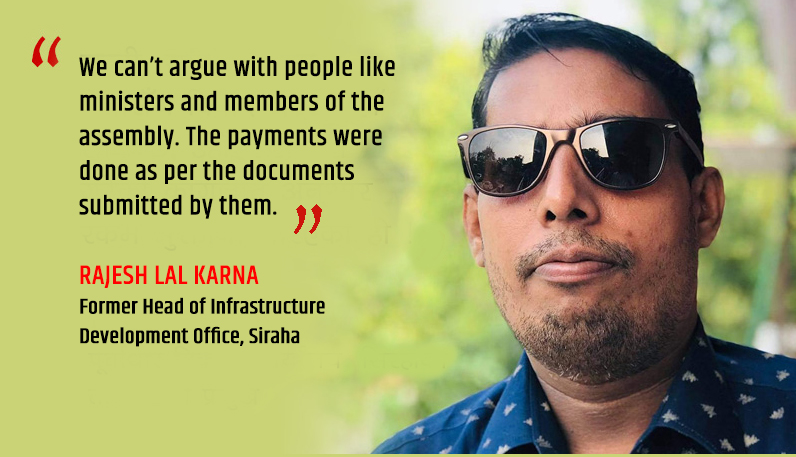
He has presented a cash bill showing an expenditure of Rs160,000 towards rent for a vehicle (KO 2 CHA 352) and Rs140,000 towards staff salary for five months.
He spent Rs65,000 on house rent, Rs40,740 on monitoring and Rs74,490 on food. There were Covid-19 restrictions in the district when such expenses were made.
Shah did not win the election this time. He claims that the money spent under administrative expenses was used on office management and monitoring and that it has not been misused.
The administrative expenses of members Gobinda Bahadur Neupane, CPN (Unified Socialist), who was elected from Saptari Constituency 4(A) is even more dumbfounding. According to bill number 409, issued by Jivan Pustak Pasal, Kadamaha-9, Neupane bought 25 pilot pens for Rs3,250, 10 diaries for Rs5,500, five pairs of scissors for Rs2,400, 50 dot pens for Rs1,500, five calculators for Rs2,750, and 10 stamp pads for Rs1,000.
When asked why 10 stamp pads, five calculators and 24 pilot pens were bought for a programme that ran for just five months, he failed to give a convincing answer.
Similarly, he has presented the cash bills of house rent, salaries paid for representatives and office helpers, car rent, food, stationery, and miscellaneous expenses.
Neupane, who was re-elected from the same constituency, claims these are the administrative expenses since the opening of office for the purpose of project’s supervision.
Province parliament member Abhishek Yadav, who was elected from Saptari constituency number 4(B), had hired Santosh Kumar Mandal to assist him. Mandal rented a car for 25 days from 2022 February to June, and the cost of Rs75,000 was added to the Constituency Development Programme.
Similarly, he presented bills of house rent, staff and assistant’s salaries.
The cash bills of petroleum purchase from the Dakneshwori Bhagawati Centre, Bodebarsain-5, Saptari, have different dates on them, but the bill numbers are: 9924, 9925, 9927, 9928, 9930, 9933, 9941, 9946, 9949, 9953, and 9956. The numbers of the bills clearly show that they were all made on the same day.
Yadav, who lost at the November elections, claims he had put the programme’s funds to good use.
Pramila Kumari Yadav, a proportionately elected Provincial Assembly member, used a private vehicle (no: Ba 2 Cha 3507), and submitted bills of 110 litre petrol and 431.46 litre diesel. She has also submitted claims of six months of house rent, salaries for representatives and office assistants, and other administrative expenses. In addition, she has submitted claims for dot pen, gel pen, and printing paper.
Yadav, who lost at the November elections, claims her work was not visible as a small budget had to be spent throughout the district.
Provincial Assembly member Dr. Manoj Kumar Singh, representing the CPN-UML, had appointed Chhedi Safi as a representative for the formulation of the plan in the fiscal year 2077/78 for ten months. Safi presented a claim of Rs225,000 for his salary on Ashad 1, 2078. He has also presented the expenses of office helpers, house rent, vehicle expenses, etc.
The bill for the Bishal Hotel in Rajbiraj-9 that Safi submitted is more astonishing. The third row of an undated bill (no: 434), mentions sweets (kala jamun), costing Rs1,760 for 22 pieces at the rate of Rs80. However, the price of the sweet in other hotels and restaurants in Rajbiraj is no more than Rs30 per piece.
Similarly, bill numbers 1466 (2021/06/08) and 1467 (2021/06/17) show that 111.62 litres of diesel was bought from Shree Mahil Oil Trade Centre (Maleth). He also could not repeat his membership in the provincial assemblies. He claims that he had efficiently spent the budget amount.
Jagat Prasad Yadav was elected as a proportionate provincial assembly member from CPN-Maoist. In the fiscal year 2020/21, he had spent Rs10 million as administrative costs which included Rs337,500 as vehicle rent, Rs75,000 as house rent, and Rs 90,000 as salary of office assistant Arun Kumar Sharma for five months.
Formulation of plans is opaque
Section (2) (a) of the Provincial Assembly Constituency Development Programme Regulations (Second Amendment) 2076 provides that “The project will be selected and implemented through a committee consisting of the members of the assembly the coordination of the elected member of the Provincial Assembly… and the committee should coordinate with local level chiefs while selecting projects.”
However, 2 (b) provides that if the projects cannot be selected based on the provisions of 2 (a), the decision of the coordinator is final. This allows the members to select projects as they like. This is why most members submit project proposals on a letterhead as if it were a normal letter. Such projects are then passed by the Infrastructure Development Offices.
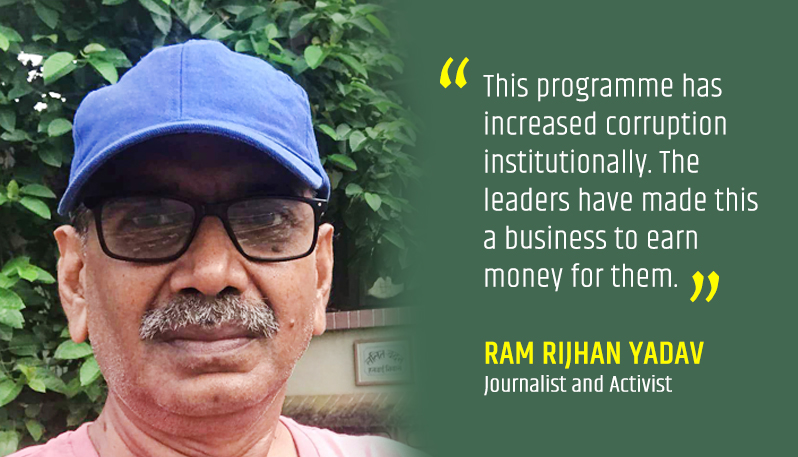
The Infrastructure Development Office, Siraha is a unit under the provincial government that implements the planning of 27 provincial assembly members of Siraha and Saptari districts. The office also manages its administrative expenses by deducting 1 percent of the contingency amount from the funds of the Provincial Assembly Member Constituency Development Programme.
Rights activist and advocate Gopi Prasad Singh alleges the Infrastructure Development Office has been paying the administrative expenses in connivance with the provincial assembly members.
An official of the consumer committee says the staff of the Infrastructure Development Office collected money from the planning of the Constituency Development Programme.
Arbind Yadav, a civil leader from Siraha, accuses Deepak Kumar Sah, head of accounts of the Infrastructure Development Office, Siraha of taking bribes from the consumer committee even for the payment of the work.
Centre for Investigative Journalism used the rights to information provision to request the Infrastructure Development Office, Siraha to provide the details of expenses, administrative expenses and the planning selected by the 27 elected provincial assembly members of Siraha and Saptari districts. Out of them, only 7 provincial assembly members have provided the administrative expenses of the projects.
When asked about the payments made on the basis of incomplete and unjustified bills, Rajesh Lal Karna, the then chief District Engineer of the Infrastructure Development Office, Siraha, said, “We can’t argue with people like ministers and members. The payments have been made as per the documents submitted by them.” Karna is currently in the Infrastructure Development Office, Janakpurdham.
Ramdev Kharga, the current District Engineer of the Infrastructure Development Office, Siraha says the payment is made based on the details provided by the respective provincial assembly members and their representatives in almost all districts. He also held the responsibilities of the Infrastructure Development Office of Parsa and Dhanusa districts previously.
Some provincial assembly members have even submitted the bills of rent paid for the Liaison Office when in reality no such offices have been opened. Even though the members who have submitted the house rent bills and have taken the payments have submitted the lease agreement and rent compensation details, they have not included the photographs of the house anywhere.
Dhurva Narayan Pandit, an engineer at the Infrastructure Development Office, confirmed that they have submitted the fake bills compensation without actually renting the house. He said that they had to prepare the cost of planning while sitting in tea shops due to the lack of liaison offices of the members.
“As there is no liaison office, we have to go to tea shops and hotels to do the planning. We are afraid that if we voice our displeasure with big leaders and ministers, we will be punished.”
Pandit had estimated the plans of Provincial Assembly Member of Siraha Constituency number 1(A), Lagan Lal Chaudhary, and Siraha Constituency number 1(B), Ashok Kumar Yadav in 2077/78.
Engineer Ram Sewak Yadav who prepared the cost estimation of the projects for members Bijay Kumar Yadav and Madan Sen Prasad Shrivastav; and Engineer Dhurva Shah, who prepared the cost estimation of the projects for members Ram Kumar Yadav, Jagat Prasad Yadav, and Dilip Shah, said they could not provide details about administrative expenses because they had to look for many plannings.
Vijaykant Karna, an expert on Madhesh affairs accuses members of cheating citizens and exploiting state funds. “Ruling parties and oppositions both are exploiting citizens’ money together,” Karna said. He insists on proper investigation of all the expenses involved in the Constituency Development Programme to stop such exploitation.
Journalist and activist Ram Rizhan Yadav said, “This programme has increased institutional corruption. The leaders have made this a business to earn money for them.”
Situation in other provinces
According to the Sudurpaschim Province Infrastructure Development Authority, the programme has been cancelled in the fiscal year 2079/80.
Jagadish Joshi, Information Officer at Office of the Prime Minister and Council of Ministers, says that, in the previous fiscal year, Rs30 million each was invested for 32 electoral constituencies.
According to the guidelines, from the one percent of the total plan’s amount, 70 percent would be provided to the related District Coordination Committee Office and the remaining 30 percent would be provided to the local level as administrative expenses.
The Lumbini Province government has made a draft in the fiscal year 2078/79, but not implemented. Ram Bahadur Karki, the spokesperson of the Ministry of Finance of the province, says that even though the budget was allocated, later it was not inclusive.
Gandaki Province has not invested the budget in the current fiscal year 2079/80.
According to Tika Ram Poudel, Spokesperson at the Ministry of Physical Infrastructure and Transport, from 2076/77, each constituency was allocated with Rs20 million for three consecutive years.
Basanta Raj tiwari, Spokesperson at the Gandaki Province Ministry of Finance, said directly elected members were allocated 60 percent of the total amount while proportionally elected members were given 40 percent. According to him, among the three fiscal years, the Office of the Prime Minister and Council of Ministers had implemented the plan in the first year, and later it was implemented by the Ministry of Physical Infrastructure and Transport.
Province 1 had allocated a budget of Rs10 million for the directly elected members of Provincial Assembly and Rs5 million for those elected through proportional representation by issuing the Provincial Assembly Constituency Development Programme (Operation) Regulations 2078).
One percent of the total amount could be spent towards the District Coordination Committee for the administrative expenses, one percent could be spent towards the office for executing the programme, and one percent for the representative’s operational management as decided by the committee coordinator.

